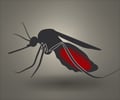A new chemical and protein that could pave the way for new treatments to combat malaria, including drug-resistant strains, has been discovered.
- Researchers at JNU have discovered a novel chemical with strong transmission-blocking activity for preventing the spread of deadly malaria parasites
- A new critical cold shock protein, PfCoSP, has been identified in malaria parasites, and targeting it with LI71 could disrupt the mosquito transmission cycle and lead to new transmission-blocking anti-malarial agents
- The discovery of these new targets gives hope for fighting drug-resistant malaria and controlling the disease to save lives
New Protein Protecting Malaria Parasites from Cold Environments
JNU researchers discovered a new cold shock protein of Plasmodium falciparum that is required for the sexual and asexual growth of malaria parasites. Because the malaria parasite suffers from low-temperature stress in mosquitos, this protein protects the pathogen from cold environments.Understanding the Life Cycle and Types of Malaria Parasites that Infect Humans
Malaria is a mosquito-borne disease caused by a parasite that grows and multiplies initially in the liver cells and subsequently in the red blood cells. The parasite multiplies and spreads within the red blood cells. Humans are infected by four types of malaria parasites, according to the Centres for Disease Control and Prevention in the United States: Plasmodium falciparum, Plasmodium vivax, Plasmodium ovale, and Plasmodium malariae.Potential New Treatment for Malaria: Targeting Critical Cold Shock Protein Using LI71
According to the study published in the journal, iScience, cold shock proteins are expressed in bacteria, plants, and people to resist the negative effects of low temperatures, and they play an important role in learning cold tolerance. "Cold shock proteins are known to destabilise secondary structures in target RNA, allowing efficient transcription and translation," according to the report. Scientists have now proposed blocking the growth and transmission of malaria parasites by targeting this critical Plasmodium cold shock protein using LI71.New Transmission-Blocking Anti-Malarial Agent
"We have achieved a significant milestone in the development of a transmission-blocking anti-malarial agent. Most of the antimalarial drugs used for treating the asexual stages of P. falciparum have little or no direct effects on P. falciparum gametocytes. our study has identified a novel candidate protein ‘PfCoSP’ for developing transmission-blocking compounds," Prof. Shailja Singh, who is the corresponding author of the study, said in a statement.Plasmodium falciparumfCoSP (PfCoSP) is a cold shock protein of the malaria parasite that has been discovered to have a critical role in the parasite's adaptation to cold stress conditions inside the mosquito host. LI71's inhibition of this protein would thereby disrupt the mosquito transmission cycle.
New Hope for Fighting Drug-Resistant Malaria
As the parasite has developed coping mechanisms against it, research into improving anti-malarial medications is ongoing. "Resistance to currently available anti-malarial drugs necessitates additional drug lead identification efforts and further research into this lethal disease," said the study's first author, Dr. Ankita Behl, SERB-NPDF.The team hopes that their new work could pave way for targetting drug-resistant parasites. "We know that malaria elimination remains a major global health concern, so we must employ every tool on our part and develop new ones. This discovery gives us optimism that malaria can be controlled and lives can be saved”, she concluded," Rumaisha Shoaib, another lead author of the paper said.
Source-Medindia












